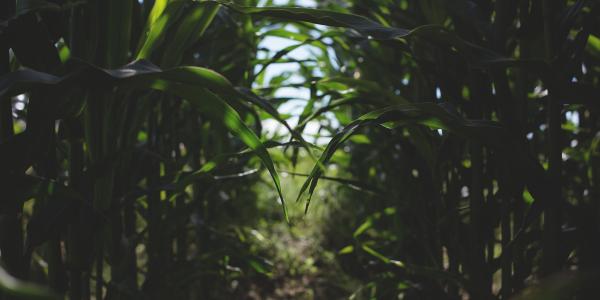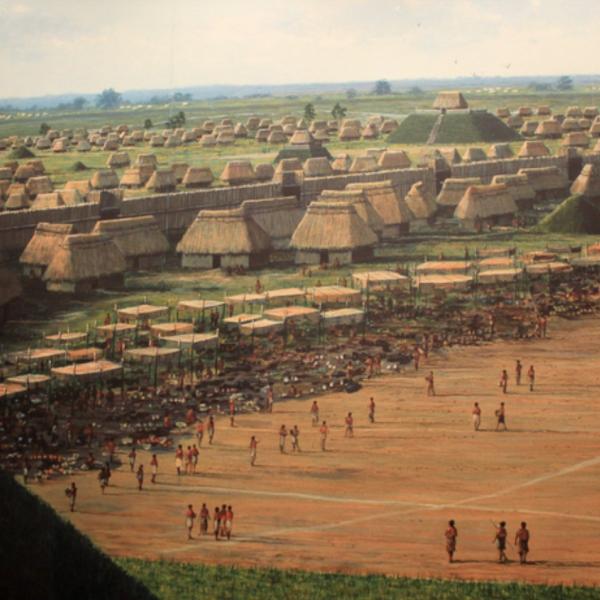Barbara Schaal, dean of the faculty of Arts & Sciences and world-renowned evolutionary plant biologist, discusses the importance of basic research in a time of environmental change.
After six years as dean of the faculty of Arts & Sciences, Barbara Schaal recently announced plans to step down at the end of the 2019-20 academic year and return to the faculty in the Department of Biology.
Schaal's vision and expertise is recognized far beyond Washington University – she has served as president of the American Association for the Advancement of Science and as a member of President Obama’s Council of Advisors for Science and Technology, among several national leadership roles. Most recently, the National Science Board awarded Schaal the 2019 NSB Public Service Award. Established in 1996, this esteemed award honors exemplary service in promoting public understanding of science and engineering.
To read more about Schaal's service to Arts & Sciences and her future plans, visit The Source. Here, Schaal discusses topics from a talk she presented at the XIX International Public Congress, which served as the basis for a 2018 paper in the journal Plants People Planet.

How long have you been speaking about public scientific issues?
I was vice president of the National Academy of Sciences, and as part of that I started thinking about issues of science that affect the public such as the teaching of evolution and genetically modified foods. I was elected vice president in 2005 and spent considerable time in Washington, D.C. That was the first time I was deeply involved in larger issues.
Do you have any plans, in the context of WashU, about how to bring together different disciplines to combat climate change?
One of the things that surprised me when I began working in Washington, D.C., was at that time, how little climate change was part of the conversation at WashU. That of course has changed. We’ve hired new faculty in the natural and social science departments that are focused on climate change, but I think the policy areas could be enhanced as well. It’s one thing to document climate change and understand the underlying causes, but then we need to do something about it as well. I know our students are deeply interested in concrete action.
Do you think scientists have a duty to focus their research on more pragmatic approaches toward climate change?
We have no idea what’s going to emerge as key technologies in addressing the impacts of climate change. Discoveries in fundamental science are the basis of new technologies, and oftentimes, early on, science has no immediate or apparent application. An increasing number of national governments are putting resources into basic research because they know new knowledge leads to new technologies. GPS is a great example. It doesn’t function without corrections for relativity. Who would’ve thought that when Einstein was developing his theory in 1916, it would lead to a technology that allows us to use our iPhones to figure out nearly exactly where we are and where we are going?
"We have no idea what’s going to emerge as key technologies in addressing the impacts of climate change. Discoveries in fundamental science are the basis of new technologies, and oftentimes, early on, science has no immediate or apparent application."
A lot of distrust in science seems to stem from how unobvious benefits from research are.
There are a number of reasons for distrust. Not all scientific discoveries lead to results that are going to be beneficial. There are a lot of discoveries that allow us to know our natural world better. To me, that’s important. Sometimes the nature of such basic science may seem silly to the public. I remember one politician mocking the study of fruit files, not understanding that they are a model system for the understanding of genetic issues, including those in humans. Another reason for such distrust probably stems from the current rise of anti-intellectualism; scientists are perceived as part of an intellectual elite. At the same time, scientists often aren’t good communicators. Lack of adequate communication is a concern; science has an obligation to inform the public and governments about the scientific facts surrounding a given issue. The National Research Council, which is a part of the National Academy of Sciences, was created in order to help the government make policy decisions based on science. The first study they did back during the Civil War solved the dilemma of how to use a compass in a metal-hulled ship. It was President Lincoln, back in 1863, who started the Academy. At first it was just Academy members opining, but now the most knowledgeable people in the nation come together to provide information. I love working with the NRC. There are a diversity of topics ranging from health, to social sciences, and to the environment including water contamination, genetically modified crops, and the many issues related to climate change.
How do you think climate change will affect science?
The way the research itself is conducted won’t be affected. But the urgency of such research and the nature of the questions will most certainly change. There is definitely a natural turn toward topics associated with climate change across many areas of science. And I think that’s because we’re all citizens, and many of us are thinking of our own families and our own areas of specialization. For example, if you’re an ecologist, you’re thinking about the loss of biodiversity, and if you're in public health, changes in the range of vectors for diseases like Zika and dengue fever. What my lab did that was most associated with climate change was work with rice varieties. My colleagues in Thailand were studying indigenous peoples and the rice varieties they use. We studied rice that grew at different elevations, and we documented that the rice varieties evolved (genetically changed), in response to the changing climates at different elevations.
"There is definitely a natural turn toward topics associated with climate change across many areas of science. And I think that’s because we’re all citizens, and many of us are thinking of our own families and our own areas of specialization."
Do you think that the feedback among plants and the environment could be so rapid in the future that humans would no longer be able to cultivate or domesticate crops to keep up?
That’s been one of the concerns for agriculture. And this is debated. Often our varieties of crops are well suited for a particular environment. One worries that if the environment changes dramatically then those varieties wouldn’t provide adequate yield in the regions where they have in the past. Some people say we’ll just plant everything at different locations. But that would most likely require new varieties. The debate has been in part how fast can we produce new varieties that are well adapted and able to produce high yields.
It’s amazing how complex this problem is. Every little change has the potential to influence so many other aspects of society.
One aspect that bothers me is how spring is arriving earlier and earlier and its affect on biodiversity. Bird migration patterns are very often based on day length. Day length hasn’t changed in response to climate change, but clearly the temperatures have. So if the plants come out earlier in response to the warmer temperatures, then insects might come out earlier as well. Since birds eat insects to produce their eggs and feed their young, there could be a timing mismatch. We don’t know for sure if that’s true, but that’s one of the things that people worry about. If you think about the kind of variability that is predicted, such as having a minus-five-degree day followed by a 65-degree day the next week, that’s a real challenge for plants and animals as well.
Do you think there’s one specific approach to these problems that’s the most important for now?
There are two approaches – adaptation and mitigation. You can adapt to climate change, and you can also prevent climate change or slow it down. For the first, there’s the question of what is the limit of adaptation? What is the point at which you can no longer adapt? There are a lot of unanswered questions.
What's one way that we can respond at the local level, here at WashU?
I think one of the things that we need to think about is policy. I would love to see a course in which we start looking at policy and then take a deep dive on proposed bills that are coming through Congress that relate to this and other environmental legislation.




